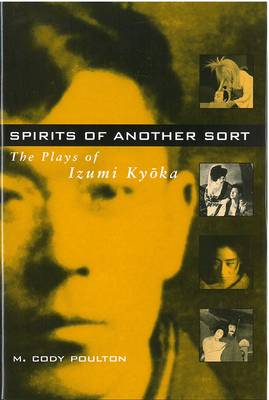
Bedankt voor het vertrouwen het afgelopen jaar! Om jou te bedanken bieden we GRATIS verzending (in België) aan op alles gedurende de hele maand januari.
- Afhalen na 1 uur in een winkel met voorraad
- In januari gratis thuislevering in België
- Ruim aanbod met 7 miljoen producten
Bedankt voor het vertrouwen het afgelopen jaar! Om jou te bedanken bieden we GRATIS verzending (in België) aan op alles gedurende de hele maand januari.
- Afhalen na 1 uur in een winkel met voorraad
- In januari gratis thuislevering in België
- Ruim aanbod met 7 miljoen producten
Zoeken
€ 76,45
+ 152 punten
Omschrijving
Izumi Kyōka (1873-1939) had a predilection for the richly figurative and supernatural that seemed not only irrelevant to the concerns of modern life but an affront to the social and psychological realism that became the common currency of both literature and theater in modern Japan. Believing in beauty and truth and in language's mystical evocation of experience, Kyōka sought for a way to reinvest the world with a kind of magic that he felt was being lost. Although better known as a novelist, Kyōka also wrote a large number of plays, and his work has continued to be adapted by others for the stage and screen. Spirits of Another Sort, the first work in any language to focus on Izumi Kyōka's career as a playwright, argues that the dramas reveal, in an often unmitigated fashion, the writer's romanticism, his belief in the occult, his aversion to contemporary society, and his idiosyncratic but powerful ethical and aesthetic ideals. In an attempt to create a dramaturgy of the sacred from the dregs of the past, Kyōka's plays resemble the work of Maeterlinck or even Artaud. Spirits of Another Sort is a literary-critical study that traces the development of Kyōka's work from the melodramatic formulas of his early ideological fiction to the increasingly grotesque and fantastic permutations of the original pattern in his plays of the Taishō era. It is important reading for people interested in Japanese literature, theater, and film and in cross-cultural theater and film.
Specificaties
Betrokkenen
- Auteur(s):
- Uitgeverij:
Inhoud
- Aantal bladzijden:
- 380
- Taal:
- Engels
- Reeks:
- Reeksnummer:
- nr. 29
Eigenschappen
- Productcode (EAN):
- 9780939512010
- Verschijningsdatum:
- 30/05/2001
- Uitvoering:
- Hardcover
- Formaat:
- Genaaid
- Afmetingen:
- 168 mm x 244 mm
- Gewicht:
- 662 g

Alleen bij Standaard Boekhandel
+ 152 punten op je klantenkaart van Standaard Boekhandel
Beoordelingen
We publiceren alleen reviews die voldoen aan de voorwaarden voor reviews. Bekijk onze voorwaarden voor reviews.









